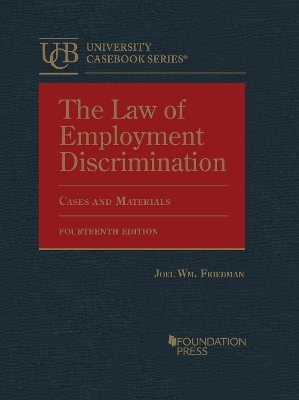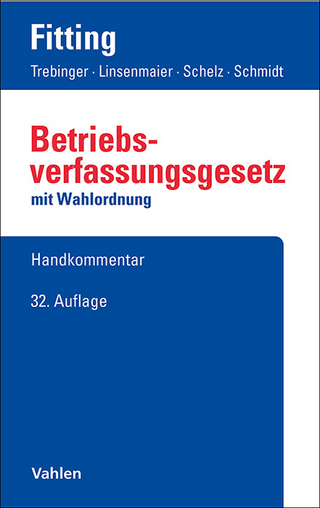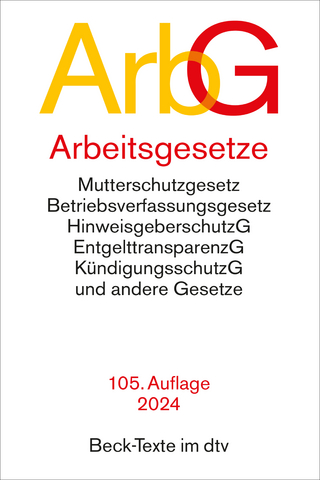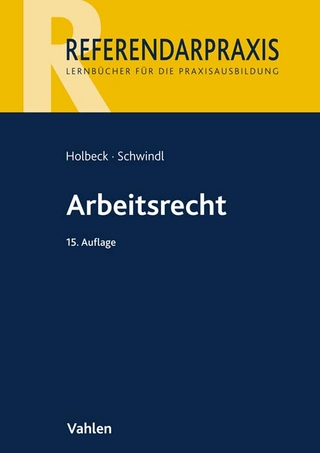
The Law of Employment Discrimination
Cases and Materials
Seiten
2024
|
14th Revised edition
Foundation Press (Verlag)
978-1-64708-975-7 (ISBN)
Foundation Press (Verlag)
978-1-64708-975-7 (ISBN)
One of the most comprehensive and frequently updated texts on the market, this casebook covers all major aspects of employment discrimination law, including benchmark legislative, administrative, and judicial developments.
This casebook covers all major aspects of employment discrimination law, including benchmark legislative, administrative, and judicial developments. Due in part to frequent updates and revisions, it has received accolades as one of the most comprehensive and frequently updated texts on the market. The 14th Edition continues this tradition by seamlessly incorporating all major legislative and judicial developments through July 2023, including all relevant decisions rendered by the Supreme Court in its 2022-2023 term. The major Supreme Court rulings were in Groff v. Dejoy and Students for Fair Admissions, Inc. v. President and Fellows of Harvard College. In Groff, a unanimous Court expanded an employer's duty to accommodate religious beliefs and practices under Title VII by ruling that the standard of undue hardship requires a showing that the burden is substantial in the overall context of an employer's business, including an assessment of the impact on the coworkers. Instead of having to prove only the incurring of a de minimis expense, an employer now must show the burden is excessive or unjustifiable. In Students for Fair Admissions, a non-employment case, a six-member majority ruled that the use of race in the admissions policies of the two defendants (Harvard and the University of North Carolina) violated the Equal Protection Clause of the Fourth Amendment. Applying strict scrutiny to the defendant's acknowledged use of race in their admissions processes, the Court ruled that these programs failed both the compelling interest and narrowly tailored components of strict scrutiny.
There also were important circuit court opinions. In Demkovich v. St. Andrew, the en banc Seventh Circuit ruled that the ministerial exception under Title VII barred any claim against a minister regardless of whether it alleged the existence of a tangible employment action or solely a hostile environment. In Gogel v. Kia Motors, the en banc Eleventh Circuit held that §704(a) will not protect an employee who alleges retaliation for engaging in protected opposition conduct when the means by which the employee expressed that opposition so interfered with the performance of that employee's duties as to render that employee ineffective in their position. In Roberts v. Glenn, the Fourth Circuit added itself to the list of circuits construing the Supreme Court's ruling in Oncale (about "same sex" harassment cases) as allowing a plaintiff to establish the existence of proscribed sex-based discrimination by proving that the plaintiff was subjected to harassment because the plaintiff was perceived as not conforming to traditional gender stereotypes. And in Williams v. Kincaid, in a case of first impression, the Fourth Circuit concluded that a transgender individual with gender dysphoria did not fall within the ADA's exclusion of "gender identity disorders not resulting from physical impairments" from the category of covered disabilities.
This casebook covers all major aspects of employment discrimination law, including benchmark legislative, administrative, and judicial developments. Due in part to frequent updates and revisions, it has received accolades as one of the most comprehensive and frequently updated texts on the market. The 14th Edition continues this tradition by seamlessly incorporating all major legislative and judicial developments through July 2023, including all relevant decisions rendered by the Supreme Court in its 2022-2023 term. The major Supreme Court rulings were in Groff v. Dejoy and Students for Fair Admissions, Inc. v. President and Fellows of Harvard College. In Groff, a unanimous Court expanded an employer's duty to accommodate religious beliefs and practices under Title VII by ruling that the standard of undue hardship requires a showing that the burden is substantial in the overall context of an employer's business, including an assessment of the impact on the coworkers. Instead of having to prove only the incurring of a de minimis expense, an employer now must show the burden is excessive or unjustifiable. In Students for Fair Admissions, a non-employment case, a six-member majority ruled that the use of race in the admissions policies of the two defendants (Harvard and the University of North Carolina) violated the Equal Protection Clause of the Fourth Amendment. Applying strict scrutiny to the defendant's acknowledged use of race in their admissions processes, the Court ruled that these programs failed both the compelling interest and narrowly tailored components of strict scrutiny.
There also were important circuit court opinions. In Demkovich v. St. Andrew, the en banc Seventh Circuit ruled that the ministerial exception under Title VII barred any claim against a minister regardless of whether it alleged the existence of a tangible employment action or solely a hostile environment. In Gogel v. Kia Motors, the en banc Eleventh Circuit held that §704(a) will not protect an employee who alleges retaliation for engaging in protected opposition conduct when the means by which the employee expressed that opposition so interfered with the performance of that employee's duties as to render that employee ineffective in their position. In Roberts v. Glenn, the Fourth Circuit added itself to the list of circuits construing the Supreme Court's ruling in Oncale (about "same sex" harassment cases) as allowing a plaintiff to establish the existence of proscribed sex-based discrimination by proving that the plaintiff was subjected to harassment because the plaintiff was perceived as not conforming to traditional gender stereotypes. And in Williams v. Kincaid, in a case of first impression, the Fourth Circuit concluded that a transgender individual with gender dysphoria did not fall within the ADA's exclusion of "gender identity disorders not resulting from physical impairments" from the category of covered disabilities.
| Erscheinungsdatum | 12.12.2023 |
|---|---|
| Reihe/Serie | University Casebook Series |
| Verlagsort | Minnesota |
| Sprache | englisch |
| Maße | 191 x 254 mm |
| Gewicht | 272 g |
| Themenwelt | Recht / Steuern ► Arbeits- / Sozialrecht ► Arbeitsrecht |
| Recht / Steuern ► EU / Internationales Recht | |
| Wirtschaft ► Betriebswirtschaft / Management ► Personalwesen | |
| Wirtschaft ► Betriebswirtschaft / Management ► Unternehmensführung / Management | |
| ISBN-10 | 1-64708-975-1 / 1647089751 |
| ISBN-13 | 978-1-64708-975-7 / 9781647089757 |
| Zustand | Neuware |
| Informationen gemäß Produktsicherheitsverordnung (GPSR) | |
| Haben Sie eine Frage zum Produkt? |
Mehr entdecken
aus dem Bereich
aus dem Bereich
mit Wahlordnung | Handkommentar
Buch | Hardcover (2024)
Franz Vahlen (Verlag)
95,00 €
mit den wichtigsten Bestimmungen zum Arbeitsverhältnis, …
Buch | Softcover (2024)
dtv Verlagsgesellschaft
13,90 €


